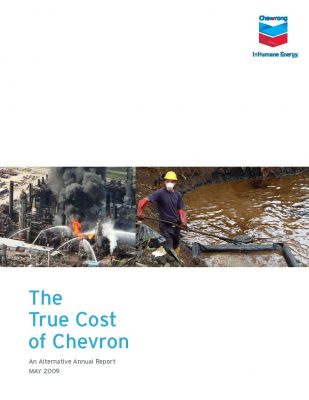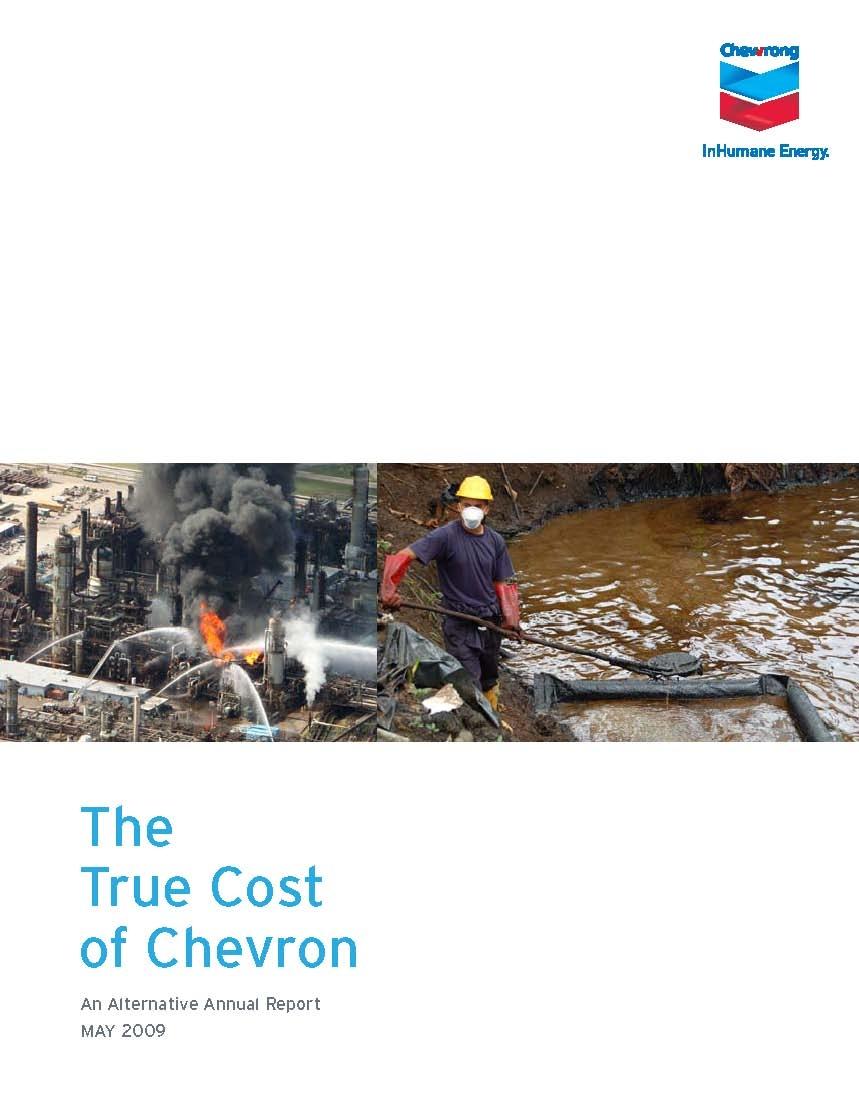 Chevron’s 2008 Annual Report to its shareholders is a glossy celebration heralding the company’s most profitable year in its history. Its $24 billion in profits catapulted it past General Electric to become the second most profitable corporation in the United States. Its 2007 revenues were larger than the gross domestic product (GDP) of 150 nations.
Chevron’s 2008 Annual Report to its shareholders is a glossy celebration heralding the company’s most profitable year in its history. Its $24 billion in profits catapulted it past General Electric to become the second most profitable corporation in the United States. Its 2007 revenues were larger than the gross domestic product (GDP) of 150 nations.
What Chevron’s Annual Report does not tell its shareholders is the true cost paid for those financial returns: the lives lost, wars fought, communities destroyed, environments decimated, livelihoods ruined, and political voices silenced. Nor does it describe the global resistance movement gaining voice and strength against these operations.
Thus, we, the communities and our allies who bear the consequences of Chevron’s oil and natural gas production, refineries, depots, pipelines, exploration,offshore drilling rigs, coal fields, chemical plants, political control, consumer abuse, false promises, and much more, have prepared an Alternative Annual Report for Chevron.
Our account reveals the true impact of just a handful of Chevron’s operations in the United States in communities across Alaska, California, Colorado, Florida, the Gulf Coast, Mississippi, New Jersey, New York, Utah, Washington, D.C, and Wyoming; internationally across Angola, Burma, Canada, Chad, Cameroon, Ecuador, Iraq, Kazakhstan, Nigeria, and the Philippines. These accounts are demonstrative, not inclusive. We would need 100 reports to take account of all such impacts. These accounts include active lawsuits against the company from across the country and around the world, totalling in the tens of billions of dollars, which threaten its vaulted financial gains. For when a company operates in blatant disregard for the health, security, livelihood, safety, and environment of communities within which it operates, there can be real financial repercussions.
The world sits on a precipice. Oil is running out. The oil that is left is found in more environmentally, socially, and politically sensitive areas and is more hotly contested. Chevron contends in its 2008 Annual Report that “Meeting future demand will be one of the world’s great challenges—but one that Chevron is convinced can be met in an environmentally responsible way.” Nothing in this report supports such a contention. Nor does it indicate that Chevron will be able (or seek) to do so in a manner that protects social, political, or human rights.
While spending, at best, less than 3 percent of its capital and exploratory budget on green energy in 2008, Chevron may wish to market itself as an “alternative energy” company that is “part of the solution,” but few truly believe its hype. Rather, the movements to embrace real energy alternatives and hold Chevron to a full account for its disastrous actions is gaining far greater currency than the company’s billions can ultimately withstand.
The costs associated with extracting what is left of the world’s oil will only rise. We ask readers to view these costs not as abstract issues but as factors that directly harm the lives of real people all across the planet, including your own. And to know that change is coming.
